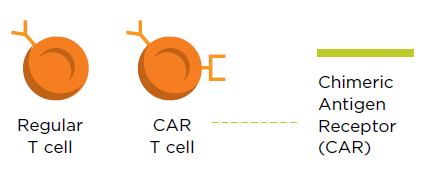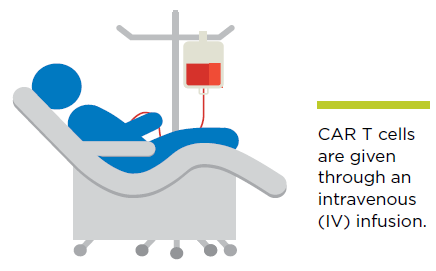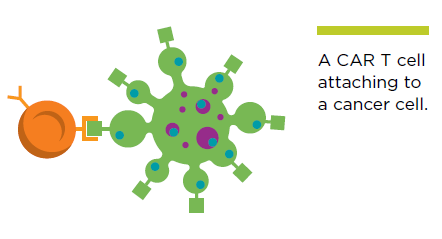Watch this video to learn about CAR T cell therapy.
What is the process of getting treated with CAR T cell therapy?
- Your T cells are collected from your bloodstream through a process called apheresis. This process is similar to donating blood and takes a few hours in the clinic.
- Then, your T cells are sent to a lab to be treated with gene therapy. Your T cells’ genes are reprogrammed so that they make special proteins called CARs. CAR stands for Chimeric Antigen Receptor. The CAR T cells are grown in a lab for 2 – 6 weeks
until there are millions of them. During this time you’ll be at home or getting other treatments.

- About 1-2 weeks before the CAR T cells are given to you, you’ll go to the clinic or hospital to get standard chemotherapy infusions. These drugs are given to remove your regular T cells to make room for the CAR T cells.
- You’ll be in the hospital or clinic on the day of your CAR T cell infusion. The infusion takes about an hour. You’ll be closely monitored for several hours afterwards. You’ll go home if the doctors think you’re doing well enough.

- Treatment isn’t over after the infusion. Most people need bone marrow biopsies over the next few weeks to monitor how the treatment is working. You may even get more infusions of CAR T cells. Doctors will continue to monitor your health for up to
15 years.
What are the risks?
There are serious potential side effects from CAR T cells. In rare cases, people have died from it. Call your doctor right away if you have any new signs or symptoms. You may need to go back to the hospital so the doctors can watch you closely, even if your symptoms are mild. Two serious potential side effects include:
- Cytokine release syndrome (CRS)
CAR T cell therapy can cause a strong immune reaction, similar to a severe allergy or serious infection. This can happen anytime during the first few weeks after treatment. Most people have some CRS and it ranges from mild to life-threatening. Some signs of CRS include fevers, chills, sore throat, headaches, rash and worsening fatigue. - Neurotoxicity
CAR T cell therapy can affect your brain. Some people have had seizures, confusion or forgetfulness after CAR T cell infusions. It’s important for your caregivers to report any changes in your speech, memory, or coordination to your doctor right away.
Could CAR T cell therapy help me?

CAR T cell therapy is primarily for people with blood cancers who have had other standard treatments, like chemo or transplant, but the cancer came back or didn’t get better.
Right now, CAR T cells are not an option for people who have been
newly diagnosed with a blood cancer.
How do I find a CAR T cell clinical trial?
Contact our Clinical Trials Search & Support team for free support and resources:
CALL: 1 (888) 814-8610
EMAIL: contact@ctsearchsupport.org
LEARN MORE: ctsearchsupport.org
